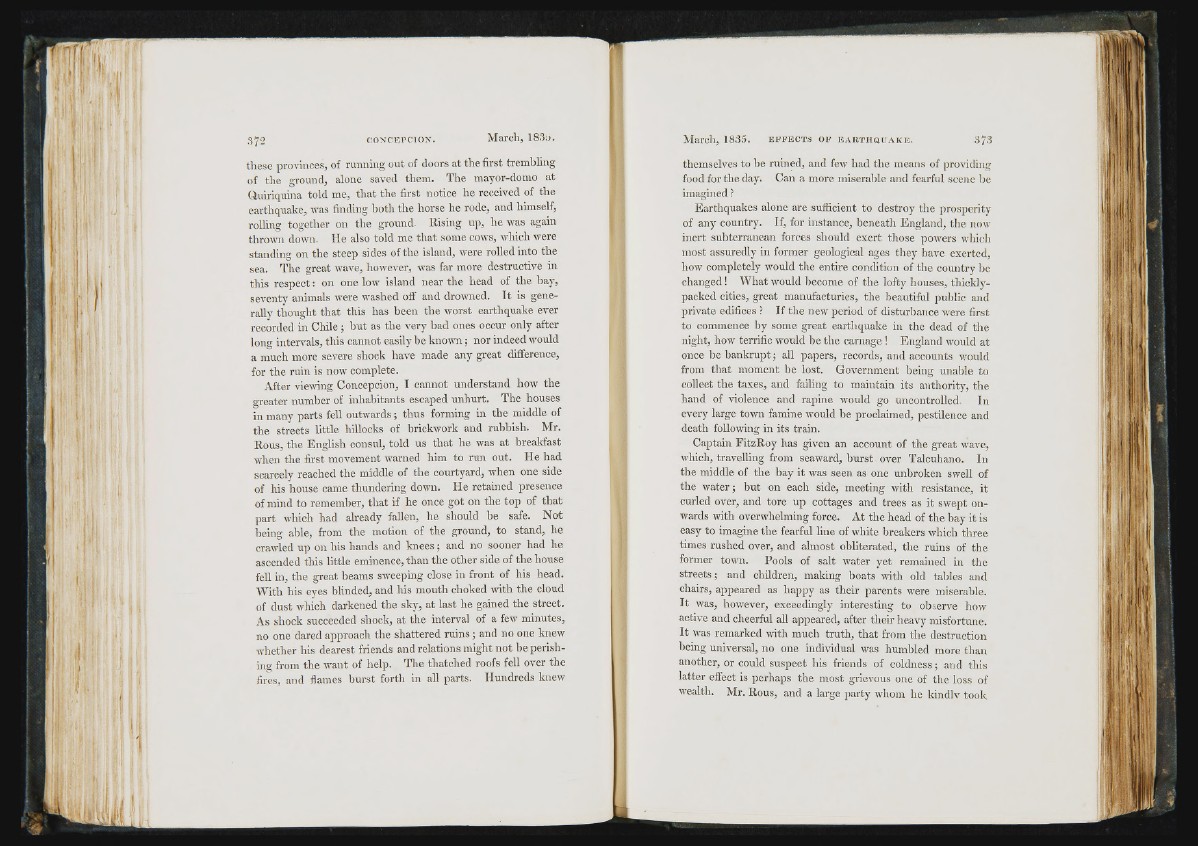
I . , p . ftfl t'
i l i l , ■)
these provinces, of running out of doors at the first trembling
of the ground, alone saved them. The mayor-domo at
Quiriquina told me, that the first notice he received of the
earthquake, was finding both the horse he rode, and himself,
rolling together on the ground. Rising up, he was again
thrown down. He also told me that some cows, which were
standing on the steep sides of the island, were rolled into the
sea. The great wave, however, was far more destructive in
this respect; on one low island near the head of the bay,
seventy animals were washed off and drowned. It is generally
thought that this has been the worst earthquake ever
recorded in Chile ; but as the very bad ones occur only after
long intervals, this cannot easily be known; nor indeed would
a much more severe shock have made any great difference,
for the ruin is now complete.
After viewing Concepcion, I cannot understand how the
greater number of inhabitants escaped unhurt. The houses
in many parts fell outwards; thus forming in the middle of
the streets little hillocks of brickwork and rubbish. Mr.
Rous, the English consul, told us that he was at breakfast
when the first movement warned him to run out. He had
scarcely reached the middle of the courtyard, when one side
of his house came thundering down. He retained presence
of mind to remember, that if he once got on the top of that
part which had already fallen, he should be safe. Not
being able, from the morion of the ground, to stand, he
crawled up on his hands and knees; and no sooner had he
ascended this little eminence, than the other side of the house
fell in, the great beams sweeping close in front of his head.
With his eyes blinded, and his mouth choked with the cloud
of dust which darkened the sky, at last he gained the street.
As shock succeeded shock, at the interval of a few minutes,
no one dared approach the shattered ruins; and no one knew
whether his dearest friends and relations might not be perishing
from the want of help. The thatched roofs fell over the
fires, and flames burst forth in all parts. Hundreds knew
themselves to be ruined, and few had the means of providing
food for the day. Can a more miserable and fearful scene be
imagined ?
Earthquakes alone are sufficient to destroy the prosperity
of any country. If, for instance, beneath England, the now
inert subterranean forces should exert those powers which
most assuredly in former geological ages they have exerted,
how completely would the entire condition of the country be
changed ! What would become of the lofty houses, thickly-
packed cities, great manufacturies, the beautiful public and
private edifices ? If the new period of disturbance were first
to commence by some great earthquake iu the dead of the
night, how terrific would be the carnage ! England would at
once be bankrupt; all papers, records, and accounts would
from that moment be lost. Government being unable to
collect the taxes, and failing to maintain its authority, the
hand of violence and rapine would go uncontrolled. In
every large town famine would be proclaimed, pestilence and
death following in its train.
Captain FitzRoy has given an account of the great wave,
which, travelling from seaward, burst over Talcuhano. In
the middle of the bay it was seen as one unbroken swell of
the water; but on each side, meeting with resistance, it
curled over, and tore up cottages and trees as it swept onwards
with overwhelming force. At the head of the bay it is
easy to imagine the fearful line of white breakers which three
times rushed over, and almost obliterated, the ruins of the
former town. Pools of salt water yet remained in the
streets; and children, making boats with old tables and
chairs, appeared as happy as their parents were miserable.
It was, however, exceedingly interesting to observe how
active and cheerful all appeared, after their heavy misfortune.
It was remarked with much truth, that from the destruction
being universal, no one individual was humbled more than
another, or could suspect his friends of coldness; and this
latter effect is perhaps the most grievous one of the loss of
wealth. Mr. Rous, aud a large party whom he kindlv took